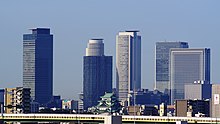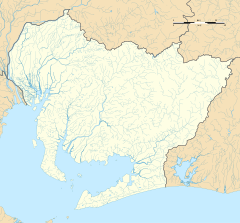Nagoya Station
CA68 CF00 CJ00 H08 S02 Nagoya Station 名古屋駅 | |||||||||||||||||||||||||||||||||||||
|---|---|---|---|---|---|---|---|---|---|---|---|---|---|---|---|---|---|---|---|---|---|---|---|---|---|---|---|---|---|---|---|---|---|---|---|---|---|
 | |||||||||||||||||||||||||||||||||||||
| General information | |||||||||||||||||||||||||||||||||||||
| Location | 1-4, Meieki 1-chōme, Nakamura-ku, Nagoya Aichi Prefecture Japan | ||||||||||||||||||||||||||||||||||||
| Coordinates | 35°10′14.78″N 136°52′53.77″E / 35.1707722°N 136.8816028°E | ||||||||||||||||||||||||||||||||||||
| Operated by | |||||||||||||||||||||||||||||||||||||
| Line(s) | |||||||||||||||||||||||||||||||||||||
| Connections | |||||||||||||||||||||||||||||||||||||
| History | |||||||||||||||||||||||||||||||||||||
| Opened | 1 May 1886 | ||||||||||||||||||||||||||||||||||||
| |||||||||||||||||||||||||||||||||||||
| |||||||||||||||||||||||||||||||||||||
Nagoya Station (名古屋駅, Nagoya-eki) is a major railway station in Nakamura-ku, Nagoya, Japan. It is Japan's, and one of the world's largest train stations by floor area (410,000 m2),[1] and houses the headquarters of the Central Japan Railway Company (JR Central). Much of this space is located in the JR Central Towers atop the station, as well as in underground concourses. The current station complex was completed on December 20, 1999. The station and the area around it is officially called Meieki (名駅) in the Japanese addressing system.
The station is adjacent to Meitetsu Nagoya Station, the terminal of Meitetsu, and Kintetsu Nagoya Station, the terminal of the Kintetsu Nagoya Line.
The twin-towered station rises over 50 storeys, and is the tallest railway-station building in the world.[2]
In the middle of 2024, Nagoya was found to be one of the 50 busiest train stations in the world with an average number of 1.1 million people using the station everyday.[3][4]
Lines
JR Central
 Tōkaidō Shinkansen (for Shin-Yokohama, Tokyo, Kyoto, and Shin-Osaka)
Tōkaidō Shinkansen (for Shin-Yokohama, Tokyo, Kyoto, and Shin-Osaka)- Tōkaidō Main Line (for Gifu, Ōgaki, Maibara, Obu, Kariya, Okazaki, Gamagori, Toyohashi, and Hamamatsu)
- Chūō Main Line (for Kozoji, Tajimi, and Nakatsugawa)
- Kansai Main Line (for Yokkaichi, Tsu, and Kameyama)
Aonami Line
- Aonami Line (AN01) (for Kinjo-Futo Nagoya International Exhibition Hall)
Nagoya Subway
 Higashiyama Line (H08)
Higashiyama Line (H08) Sakura-dōri Line (S02)
Sakura-dōri Line (S02)
Station layout



JR Central

Six island platforms for the Tōkaidō Main Line, Chuo Line, and Kansai Line are situated in the eastern part of the station (the side where JR Central Towers are situated) and serve 12 tracks. Two island platforms for the Tokaido Shinkansen are situated in the western part and serve four tracks.
| 1/2 | ■ Tōkaidō Main Line | for Toyohashi and Taketoyo |
| 3/4 | ■ Tōkaidō Main Line | for Toyohashi and Taketoyo (through trains to the Taketoyo Line and Home Liner) for Gifu and Ōgaki (Home Liner) |
| 4 | ■ Tōkaidō Main Line | Shirasagi limited express for Tsuruga |
| 5/6 | ■ Tōkaidō Main Line | for Gifu and Ōgaki |
| 7/8 | ■ Chūō Main Line | for Tajimi and Nakatsugawa (local and rapid trains) |
| 10 | ■ Chūō Main Line | for Tajimi and Nakatsugawa (Central Liner, Home Liner) Shinano limited express for Matsumoto and Nagano |
| 11 | ■ Tōkaidō Main Line | Hida limited express for Gero, Takayama and Toyama |
| ■ Chūō Main Line | for Tajimi and Nakatsugawa (some trains) | |
| ■ Kansai Main Line | for Kuwana, Yokkaichi and Kameyama (some local trains) | |
| 12 | ■ Kansai Main Line | for Kuwana, Yokkaichi and Kameyama Nanki limited express for Matsusaka, Shingū and Kii-Katsuura |
| 13 | ■ Kansai Main Line | for Kuwana, Yokkaichi and Kameyama rapid Mie for Matsusaka, Iseshi and Toba |
| 14/15 | ■ Tōkaidō Shinkansen | for Shizuoka and Tokyo |
| 16/17 | ■ Tōkaidō Shinkansen | for Shin-Osaka and Hakata |
Adjacent stations
| « | Service | » | ||
|---|---|---|---|---|
| Tōkaidō Main Line | ||||
| Terminus | Limited Express Hida | Owari-Ichinomiya or Gifu | ||
| Terminus | Limited Express Shirasagi | Owari-Ichinomiya | ||
| Kanayama | Home Liner | Owari-Ichinomiya | ||
| Kanayama | Special Rapid | Owari-Ichinomiya | ||
| Kanayama | New Rapid | Owari-Ichinomiya | ||
| Kanayama | Rapid | Owari-Ichinomiya | ||
| Kanayama | Semi Rapid | Owari-Ichinomiya | ||
| Otobashi | Local | Biwajima | ||
| Chūō Main Line | ||||
| Kanayama or Chikusa | Limited Express Shinano | Terminus | ||
| Kanayama | All services | Terminus | ||
| Kansai Main Line | ||||
| Terminus | Limited Express Nanki | Kuwana | ||
| Terminus | Rapid Mie | Kuwana | ||
| Terminus | Rapid | Kuwana | ||
| Terminus | Semi Rapid | Kanie | ||
| Terminus | Local | Hatta | ||
Aonami Line

The station is situated in the west of the JR Central Lines, on the Inazawa Line. The station has an island platform serving two tracks with platform gates.
| 1/2 | ■ Aonami Line | for Arako and Kinjō-futō |
Adjacent stations
| « | Service | » | ||
|---|---|---|---|---|
| Aonami Line (AN 01) | ||||
| Terminus | Local | Sasashima-raibu (AN 02) | ||
| Terminus | Non-stop | Kinjō-futō (AN 11) | ||
Nagoya Municipal Subway


An island platform for the Sakura-dori Line serving two tracks is located east to west under the central concourse of JR Nagoya Station. The platform is fenced with platform gates.
An island platform for the Higashiyama Line serving two tracks is located south to north under underground city Meieki Chikagai (Meichika), in the east of JR Nagoya Station. The southern part of the platform is used for the trains for Fujigaoka and the northern one is for the trains for Takabata.
| 1 | Higashiyama Line | for Sakae, Higashiyama Koen, and Fujigaoka |
| 2 | Higashiyama Line | for Nakamura Koen and Takabata |
| 3 | Sakura-dori Line | for Imaike, Aratamabashi, Nonami, and Tokushige |
| 4 | Sakura-dori Line | to Taiko-dori |
Adjacent stations
History
Nagoya Station first opened on 1 May 1886.[5]
Station numbering was introduced to the sections of the Chuo, Kansai, and Tōkaidō Main Lines operated JR Central in March 2018; Nagoya Station was assigned station number CF00 for the Chuo Line, CJ00 for the Kansai Main Line, and CA68 for the Tōkaidō Main Line.[6][7]
- The first building of Nagoya Station, Opened 1 May 1886
- Nagoya Station as it appeared in the early 20th century
- Nagoya Station in flames, March 19, 1945, as a result of the Bombing of Nagoya in World War II
Surrounding area
- Meitetsu Nagoya Station (Nagoya Railroad)
- Kintetsu Nagoya Station (Kintetsu Railway)
- Midland Square (ミッドランドスクエア)
- JR Gate Tower (JRゲートタワー)
References
- ^ "Nagoya Station". Gojapango.com. Archived from the original on 2016-11-06. Retrieved 2013-03-26.
- ^ "Planning a Trip in Nagoya at Frommer's". Frommers.com. Archived from the original on 1 December 2017. Retrieved 29 May 2022.
- ^ "Japanese Train Stations - Japan By The Numbers". Samurai Tours. 2019-07-14. Retrieved 2024-08-12.
- ^ "The Biggest and Busiest Train Stations In Japan". JRPass.com. Retrieved 2024-08-12.
- ^ 日本国有鉄道停車場一覧 [JNR Station Directory]. Japan: Japanese National Railways. 1985. p. 21. ISBN 4-533-00503-9.
- ^ "在来線駅に駅ナンバリングを導入します" [Introducing station numbering to conventional line stations] (PDF). jr-central.co.jp (in Japanese). 13 December 2017. Archived from the original (PDF) on 18 January 2023. Retrieved 27 February 2023.
- ^ "JR東海,在来線に駅ナンバリングを導入" [JR Tokai Introduces Station Numbering to Conventional Lines]. Japan Railfan Magazine Online (in Japanese). 14 December 2017. Archived from the original on 1 November 2020. Retrieved 28 February 2023.
External links
- JR Central station information (in Japanese)
- Station Nagoya (in Japanese)
- Towers Nagoya (in Japanese)






